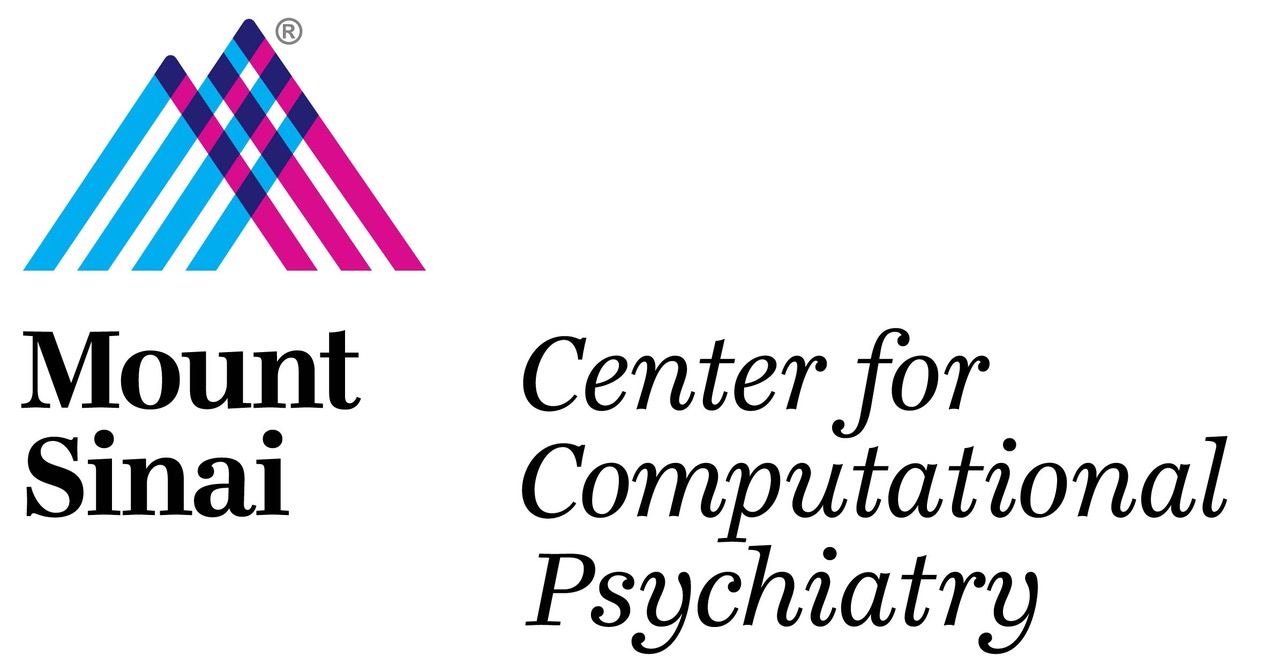
What is Computational Psychiatry?
Computational psychiatry is a new interdisciplinary field which seeks to characterize mental disorders in terms of aberrant computations at multiple scales. In recent years the field of human neuroscience, particularly functional neuroimaging, has begun to address the underlying neurobiology of changes in brain function related to psychiatric disease. This effort has produced some exciting early discoveries, but it has also highlighted the need for computational models that can bridge the explanatory gap between pathophysiology and psychopathology. The expertise and quantitative tools required to address this gap exist only across disciplines, combining skills and knowledge from investigators and clinicians that are jointly interested in solving problems of mental health.

Contact Us
Gu Laboratory
Xiaosi Gu, Ph.D.
Director, Center for Computational Psychiatry
Associate Professor, Psychiatry & Neuroscience
Center | Lab | Course | Journal
Resources
Recent Publications
2019
-
Ognibene D, Fiore VG, Gu X. Addiction beyond pharmacological effects: The role of environment complexity and bounded rationality. Neural Netw. 2019 Aug;116:269-278. doi: 10.1016/j.neunet.2019.04.022. Epub 2019 May 8. PubMed PMID: 31125913; PubMed Central PMCID: PMC6581592.
-
Wang X, Wu Q, Egan L, Gu X, Liu P, Gu H, Yang Y, Luo J, Wu Y, Gao Z, Fan J. Anterior insular cortex plays a critical role in interoceptive attention. Elife. 2019 Apr 15;8. doi: 10.7554/eLife.42265. PubMed PMID: 30985277; PubMed Central PMCID: PMC6488299.
2018
-
Fiore VG, Ognibene D, Adinoff B, Gu X. A Multilevel Computational Characterization of Endophenotypes in Addiction. eNeuro. 2018 Jul 17;5(4). pii: ENEURO.0151-18.2018. doi: 10.1523/ENEURO.0151-18.2018. eCollection 2018 Jul-Aug. PubMed PMID: 30073199; PubMed Central PMCID: PMC6071202.
-
Gu X. Incubation of craving: a Bayesian account. Neuropsychopharmacology. 2018 Jun 2. doi: 10.1038/s41386-018-0108-7. [Epub ahead of print] Review. PubMed PMID: 29930384.
-
Fiore VG, Nolte T, Rigoli F, Smittenaar P, Gu X, Dolan RJ. Value encoding in the globus pallidus: fMRI reveals an interaction effect between reward and dopamine drive. Neuroimage. 2018 Jun;173:249-257. doi: 10.1016/j.neuroimage.2018.02.048. Epub 2018 Feb 24. PubMed PMID: 29481966; PubMed Central PMCID: PMC5929903.
-
Gu X, Zhou TJ, Anagnostou E, Soorya L, Kolevzon A, Hof PR, Fan J. Heightened brain response to pain anticipation in high-functioning adults with autism spectrum disorder. Eur J Neurosci. 2018 Mar;47(6):592-601. doi: 10.1111/ejn.13598. Epub 2017 May 25. PubMed PMID: 28452081; PubMed Central PMCID: PMC5659957.
2017
-
Gu X, Zhou TJ, Anagnostou E, Soorya L, Kolevzon A, Hof PR, Fan J. Heightened brain response to pain anticipation in high-functioning adults with autism spectrum disorder. Eur J Neurosci. 2018 Mar;47(6):592-601. doi: 10.1111/ejn.13598. Epub 2017 May 25. PubMed PMID: 28452081; PubMed Central PMCID: PMC5659957.
-
Solway A, Gu X, Montague PR. Forgetting to Be Addicted: Reconsolidation and the Disconnection of Things Past. Biol Psychiatry. 2017 Dec 1;82(11):774-775. doi: 10.1016/j.biopsych.2017.09.017. PubMed PMID: 29110816.
-
Sui J, Gu X. Self as Object: Emerging Trends in Self Research. Trends Neurosci. 2017 Nov;40(11):643-653. doi: 10.1016/j.tins.2017.09.002. Epub 2017 Oct 5. Review. PubMed PMID: 28988827.
-
Gu X, Filbey F. A Bayesian Observer Model of Drug Craving. JAMA Psychiatry. 2017 Apr 1;74(4):419-420. doi: 10.1001/jamapsychiatry.2016.3823. PubMed PMID: 28199454.
-
Fiore VG, Kottler B, Gu X, Hirth F. In silico Interrogation of Insect Central Complex Suggests Computational Roles for the Ellipsoid Body in Spatial Navigation. Front Behav Neurosci. 2017 Aug 3;11:142. doi: 10.3389/fnbeh.2017.00142. eCollection 2017. PubMed PMID: 28824390; PubMed Central PMCID: PMC5540904.
2016
-
Kirk U, Gu X, Sharp C, Hula A, Fonagy P, Montague PR. Mindfulness training increases cooperative decision making in economic exchanges: Evidence from fMRI. Neuroimage. 2016 Sep;138:274-283. doi: 10.1016/j.neuroimage.2016.05.075. Epub 2016 Jun 4. PubMed PMID: 27266443; PubMed Central PMCID: PMC4954868.
-
Tian Y, Du J, Spagna A, Mackie MA, Gu X, Dong Y, Fan J, Wang K. Venlafaxine treatment reduces the deficit of executive control of attention in patients with major depressive disorder. Sci Rep. 2016 Jun 16;6:28028. doi: 10.1038/srep28028. PubMed PMID: 27306061; PubMed Central PMCID: PMC4910055.
-
Krishnan A, Woo CW, Chang LJ, Ruzic L, Gu X, López-Solà M, Jackson PL, Pujol J, Fan J, Wager TD. Somatic and vicarious pain are represented by dissociable multivariate brain patterns. Elife. 2016 Jun 14;5. pii: e15166. doi: 10.7554/eLife.15166. PubMed PMID: 27296895; PubMed Central PMCID: PMC4907690.
-
Gu X, Lohrenz T, Salas R, Baldwin PR, Soltani A, Kirk U, Cinciripini PM, Montague PR. Belief about Nicotine Modulates Subjective Craving and Insula Activity in Deprived Smokers. Front Psychiatry. 2016 Jul 13;7:126. doi: 10.3389/fpsyt.2016.00126. eCollection 2016. PubMed PMID: 27468271; PubMed Central PMCID: PMC4942468.
2015
-
Gu X, Eilam-Stock T, Zhou T, Anagnostou E, Kolevzon A, Soorya L, Hof PR, Friston KJ, Fan J. Autonomic and brain responses associated with empathy deficits in autism spectrum disorder. Hum Brain Mapp. 2015 Sep;36(9):3323-38. doi: 10.1002/hbm.22840. Epub 2015 May 21. PubMed PMID: 25995134; PubMed Central PMCID: PMC4545680.
-
Gu X, Lohrenz T, Salas R, Baldwin PR, Soltani A, Kirk U, Cinciripini PM, Montague PR. Belief about nicotine selectively modulates value and reward prediction error signals in smokers. Proc Natl Acad Sci U S A. 2015 Feb 24;112(8):2539-44. doi: 10.1073/pnas.1416639112. Epub 2015 Jan 20. PubMed PMID: 25605923; PubMed Central PMCID: PMC4345562.
-
Gu X, Wang X, Hula A, Wang S, Xu S, Lohrenz TM, Knight RT, Gao Z, Dayan P, Montague PR. Necessary, yet dissociable contributions of the insular and ventromedial prefrontal cortices to norm adaptation: computational and lesion evidence in humans.J Neurosci. 2015 Jan 14;35(2):467-73. doi: 10.1523/JNEUROSCI.2906-14.2015. PubMed PMID: 25589742; PubMed Central PMCID: PMC4293403.
2014
-
Ahn WY, Kishida KT, Gu X, Lohrenz T, Harvey A, Alford JR, Smith KB, Yaffe G, Hibbing JR, Dayan P, Montague PR. Nonpolitical images evoke neural predictors of political ideology. Curr Biol. 2014 Nov 17;24(22):2693-9. doi: 10.1016/j.cub.2014.09.050. Epub 2014 Oct 30. PubMed PMID: 25447997; PubMed Central PMCID: PMC4245707.
-
Kirk U, Gu X, Harvey AH, Fonagy P, Montague PR. Mindfulness training modulates value signals in ventromedial prefrontal cortex through input from insular cortex. Neuroimage. 2014 Oct 15;100:254-62. doi: 10.1016/j.neuroimage.2014.06.035. Epub 2014 Jun 21. PubMed PMID: 24956066; PubMed Central PMCID: PMC4140407.
-
Gu X, Kirk U, Lohrenz TM, Montague PR. Cognitive strategies regulate fictive, but not reward prediction error signals in a sequential investment task. Hum Brain Mapp. 2014 Aug;35(8):3738-49. doi: 10.1002/hbm.22433. Epub 2013 Dec 31. PubMed PMID: 24382784; PubMed Central PMCID: PMC4105325.
-
Fan J, Van Dam NT, Gu X, Liu X, Wang H, Tang CY, Hof PR. Quantitative characterization of functional anatomical contributions to cognitive control under uncertainty. J Cogn Neurosci. 2014 Jul;26(7):1490-506. doi: 10.1162/jocn_a_00554. Epub 2014 Jan 6. PubMed PMID: 24392900; PubMed Central PMCID: PMC5070967.
-
Gu X, FitzGerald TH. Interoceptive inference: homeostasis and decision-making. Trends Cogn Sci. 2014 Jun;18(6):269-70. doi: 10.1016/j.tics.2014.02.001. Epub 2014 Feb 27. PubMed PMID: 24582825.
-
Butti C, Ewan Fordyce R, Ann Raghanti M, Gu X, Bonar CJ, Wicinski BA, Wong EW, Roman J, Brake A, Eaves E, Spocter MA, Tang CY, Jacobs B, Sherwood CC, Hof PR. The cerebral cortex of the pygmy hippopotamus, Hexaprotodon liberiensis (Cetartiodactyla, Hippopotamidae): MRI, cytoarchitecture, and neuronal morphology. Anat Rec (Hoboken). 2014 Apr;297(4):670-700. doi: 10.1002/ar.22875. Epub 2014 Jan 28. PubMed PMID: 24474726.
-
Wang X, Gu X, Fan J, Wang S, Zhao F, Hof PR, Liu P, Gao Z. Recovery of empathetic function following resection of insular gliomas. J Neurooncol. 2014 Apr;117(2):269-77. doi: 10.1007/s11060-014-1380-y. Epub 2014 Feb 19. PubMed PMID: 24549750.
-
Eilam-Stock T, Xu P, Cao M, Gu X, Van Dam NT, Anagnostou E, Kolevzon A, Soorya L, Park Y, Siller M, He Y, Hof PR, Fan J. Abnormal autonomic and associated brain activities during rest in autism spectrum disorder. Brain. 2014 Jan;137(Pt 1):153-71. doi: 10.1093/brain/awt294. PubMed PMID: 24424916; PubMed Central PMCID: PMC3891443.
2013
-
Gu X, Hof PR, Friston KJ, Fan J. Anterior insular cortex and emotional awareness. J Comp Neurol. 2013 Oct 15;521(15):3371-88. doi: 10.1002/cne.23368. Review. PubMed PMID: 23749500; PubMed Central PMCID: PMC3999437.
-
Lockwood PL, Sebastian CL, McCrory EJ, Hyde ZH, Gu X, De Brito SA, Viding E. Association of callous traits with reduced neural response to others’ pain in children with conduct problems. Curr Biol. 2013 May 20;23(10):901-5. doi: 10.1016/j.cub.2013.04.018. Epub 2013 May 2. PubMed PMID: 23643836; PubMed Central PMCID: PMC3918856.
-
Van Dam NT, Sano M, Mitsis EM, Grossman HT, Gu X, Park Y, Hof PR, Fan J. Functional neural correlates of attentional deficits in amnestic mild cognitive impairment. PLoS One. 2013;8(1):e54035. doi: 10.1371/journal.pone.0054035. Epub 2013 Jan 11. PubMed PMID: 23326568; PubMed Central PMCID: PMC3543395.
-
Gu X, Liu X, Van Dam NT, Hof PR, Fan J. Cognition-emotion integration in the anterior insular cortex. Cereb Cortex. 2013 Jan;23(1):20-7. doi: 10.1093/cercor/bhr367. Epub 2012 Jan 23. PubMed PMID: 22275476; PubMed Central PMCID: PMC3513949.
2012
-
Fan J, Bernardi S, Van Dam NT, Anagnostou E, Gu X, Martin L, Park Y, Liu X, Kolevzon A, Soorya L, Grodberg D, Hollander E, Hof PR. Functional deficits of the attentional networks in autism. Brain Behav. 2012 Sep;2(5):647-60. doi: 10.1002/brb3.90. Epub 2012 Aug 27. PubMed PMID: 23139910; PubMed Central PMCID: PMC3489817.
-
Gu X, Gao Z, Wang X, Liu X, Knight RT, Hof PR, Fan J. Anterior insular cortex is necessary for empathetic pain perception. Brain. 2012 Sep;135(Pt 9):2726-35. doi: 10.1093/brain/aws199. PubMed PMID: 22961548; PubMed Central PMCID: PMC3437027.
-
Fan J, Xu P, Van Dam NT, Eilam-Stock T, Gu X, Luo YJ, Hof PR. Spontaneous brain activity relates to autonomic arousal. J Neurosci. 2012 Aug 15;32(33):11176-86. doi: 10.1523/JNEUROSCI.1172-12.2012. PubMed PMID: 22895703; PubMed Central PMCID: PMC3435430.
2011
Fan J, Gu X, Liu X, Guise KG, Park Y, Martin L, de Marchena A, Tang CY, Minzenberg MJ, Hof PR. Involvement of the anterior cingulate and frontoinsular cortices in rapid processing of salient facial emotional information. Neuroimage. 2011 Feb 1;54(3):2539-46. doi: 10.1016/j.neuroimage.2010.10.007. Epub 2010 Oct 16. PubMed PMID: 20937394; PubMed Central PMCID: PMC3006498.
2010
-
Liu X, Park Y, Gu X, Fan J. Dimensional overlap accounts for independence and integration of stimulus-response compatibility effects. Atten Percept Psychophys. 2010 Aug;72(6):1710-20. doi: 10.3758/APP.72.6.1710. PubMed PMID: 20675812.
-
Han S, Gu X, Mao L, Ge J, Wang G, Ma Y. Neural substrates of self-referential processing in Chinese Buddhists. Soc Cogn Affect Neurosci. 2010 Jun;5(2-3):332-9. doi: 10.1093/scan/nsp027. Epub 2009 Jul 20. PubMed PMID: 19620181; PubMed Central PMCID: PMC2894681.
-
Gu X, Liu X, Guise KG, Naidich TP, Hof PR, Fan J. Functional dissociation of the frontoinsular and anterior cingulate cortices in empathy for pain. J Neurosci. 2010 Mar 10;30(10):3739-44. doi: 10.1523/JNEUROSCI.4844-09.2010. PubMed PMID: 20220007; PubMed Central PMCID: PMC2845539.
2009
-
Ge J, Gu X, Ji M, Han S. Neurocognitive processes of the religious leader in Christians. Hum Brain Mapp. 2009 Dec;30(12):4012-24. doi: 10.1002/hbm.20825. PubMed PMID: 19507157.
-
Fan J, Gu X, Guise KG, Liu X, Fossella J, Wang H, Posner MI. Testing the behavioral interaction and integration of attentional networks. Brain Cogn. 2009 Jul;70(2):209-20. doi: 10.1016/j.bandc.2009.02.002. Epub 2009 Mar 6. PubMed PMID: 19269079; PubMed Central PMCID: PMC2674119.
2008
-
Gu X, Liu X, Guise KG, Fossella J, Wang K, Fan J. Alexithymic trait and voluntary control in healthy adults. PLoS One. 2008;3(11):e3702. doi: 10.1371/journal.pone.0003702. Epub 2008 Nov 12. PubMed PMID: 19002254; PubMed Central PMCID: PMC2577735.
-
Han S, Mao L, Gu X, Zhu Y, Ge J, Ma Y. Neural consequences of religious belief on self-referential processing. Soc Neurosci. 2008;3(1):1-15. doi: 10.1080/17470910701469681. PubMed PMID: 18633851.
2007
-
Gu X, Han S. Neural substrates underlying evaluation of pain in actions depicted in words. Behav Brain Res. 2007 Aug 6;181(2):218-23. Epub 2007 Apr 20. PubMed PMID: 17512615.
-
Gu X, Han S. Attention and reality constraints on the neural processes of empathy for pain. Neuroimage. 2007 May 15;36(1):256-67. Epub 2007 Feb 27. PubMed PMID: 17400480.
Team


Vincenzo Fiore, Ph.D.
Assistant Professor (PENDING)
PhD in Psychobiology and Psychopharmacology, Sapienza – Università di Roma
My main interest is in the field of dynamic neural networks, focussing on bio-constrained connectionist models of action/attention selection and decision making.
Twitter | Personal website

Anastasia Shuster, Ph.D.
Postdoctoral Fellow
PhD in Neuroscience, Tel Aviv University
I am interested in social behavior and decision-making. I use a combination of computational, economic and neural approaches to study questions like why people make dishonest choices and what drives individual differences in prosocial tendencies.
Twitter | Personal website | CV

Ofer Perl, Ph.D.
Postdoctoral Fellow
PhD in Neuroscience, Weizmann Institute of Science
Coming from a background in human olfaction research, I now take my first steps in computational psychiatry with exciting questions about models for the role of belief in nicotine addiction, and uncovering the roles of specific neurotransmitter signals in processes of social cognition. Another field I’m interested in is memory – specifically how our brains map and represent both spatial and abstract spaces of information.
Twitter | Google Scholar
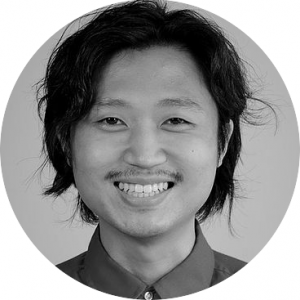
Jihan Ryu, M.D.
Resident Psychiatrist at the Mount Sinai St. Lukes-West Hospitals/ISMMS
M.D., Dartmouth College
His research interest involves modeling perception, attachment, theory of mind, and social cognition on a computational level in severe mood, trauma, and personality disorders and monitoring neurobiological changes in psychotherapy treatment.
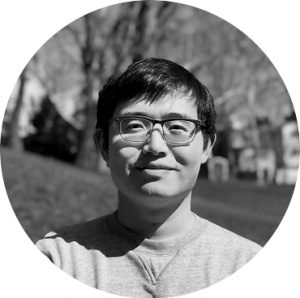
Yuyang Luo, Ph.D
Postdoctoral Fellow (co-mentored by Dr. Alex Charney)
Ph.D. in Biomedical Engineering at New Jersey Institute of Technology and Rutgers Graduate School of Biomedical Sciences
I am interested in the application of machine learning techniques to exploit useful neurobiological information from high dimensional, complex temporo-spatial, and low sample size neuroimaging data. The implementation may help us predict individual mental traits and behavioral dispositions from brain imaging data, which would contribute to understanding the connection between the cognitive state and neurobiological features.
Research Gate | Google Scholar | Twitter

Matt Heflin, B.S.
Lab Manager
B.S. in Human Development, Cornell University
I’ve always had an interest in what happens below our conscious experience and how these subconscious processes exert influence over our waking lives. I enjoy research on the origins, both psychologically and neurologically, of our thoughts, emotions, and beliefs. I plan on pursuing a PhD in either Neuropsychology or Clinical Psychology.
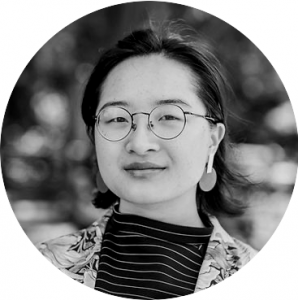
Qixiu Fu, B.A.
Research Assistant (co-mentored by Dr. Helen Mayberg)
B.A. in Experimental and Research Psychology (with Honors), New York University
I am interested in computational psychiatry and studying complex psychological experiences like pain and desperation. I am deeply amazed by statistical and computational methods, and I am excited to learn more about brain-imaging techniques and psychiatric disorders.
Personal website | Twitter

Soojung Na, M.A.
Ph.D. candidate
MA in Social Psychology, Seoul National University
I have always wondered what makes us possess different views and thoughts, not limited to individual differences but including variations across situations and cultures. The most fascinating approach I have found so far is to explore the neural and computational mechanism of the valuation system that leads one to behavioral decision making.
Google Scholar

Kaustubh Kulkarni, B.A.
M.D./Ph.D. candidate (co-mentored by Dr. Daniela Schiller)
B.A. in Cell Biology and Neuroscience, Rutgers University
Broadly, I am interested in understanding the dynamics of brain architecture in psychiatric disorders by studying the underlying cognitive, emotional and social processes. I aim to utilize computational and statistical modeling to uncover and characterize the hidden variables responsible for maladaptive states in these disorders.
Twitter
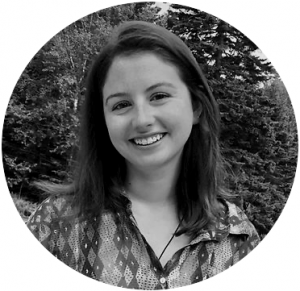
Sarah Banker, B.A.
Ph.D. candidate (co-mentored by Dr. Jennifer Foss-Feig and Dr. Daniela Schiller)
B.A. in Neuroscience and Behavior, Wesleyan University
I am interested in understanding the neural mechanisms of aberrant social behavior and decision-making in psychiatric disease. Specifically, my research aims to combine computational modeling, human neuroimaging, and clinical assessment to examine impairments in social interaction in Autism Spectrum Disorder (ASD) and Misophonia.
Twitter

Madeline O’Brien, B.A.
Ph.D. candidate
BA in Psychology and Theatre, Northwestern University
I am interested in exploring the functional neural markers of evolutionarily preserved antisocial behaviors. I use human imaging and computational modeling to elucidate the hidden neurocomputational mechanisms of anger and aggression in psychiatrically healthy individuals, so that they might be more readily understood in the context of psychiatric disorders that feature aggressive behavior as a prominent symptom.
Twitter
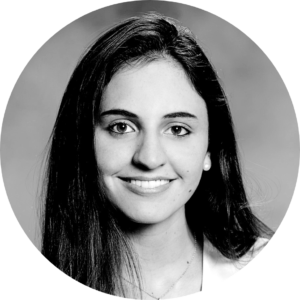
Caroline McLaughlin, B.S.
M.S. Student
B.S in Neuroscience Behavioral Biology, Emory University
I am interested in examining the neural correlates of social behavior, mainly through the lens of decision-making in psychiatric disorders. My research aims to explore computational models of the valuation system along with its associated neural markers. I am curious to understand how brain activity and valuation of fairness is altered among impulsive individuals.
Reproducibility
In recent years, it has become increasingly clear that the science community needs to come together to reinforce the transparency of scientific conduct in order to enhance the rigor and reproducibility of research. This is a cultural shift, a crucial and necessary one (because we all have seen too many studies, even published ones, that end up having no impact on science and society or cannot be replicated). Here is a list of resources we rely on to conduct and promote open and reproducible science –
The Center for Open Science and its Open Science Framework (OSF)
Includes these functions: pre-registration, code sharing / depository, project wiki (where we pre-register our studies).
Stanford Center for Reproducible Neuroscience
Led by Ross Poldrack & one of the first platforms that promotes open neuroscience
OpenNeuro
A free and open platform for analyzing and sharing neuroimaging data
Neurovault
A public repository of unthresholded statistical maps, parcellations, and atlases of the brain
Lab News
Our research assistant, Sylvia Blackmore, will be pursuing an MSc at UCL this fall. While we are sad to see her go, we are so excited to see what she does next. Best of luck Sylvia! (September 2020)
We are excited to announce several new grants that will expand our research into exciting new areas. With our close collaborators at Virginia Tech Carilion, we have received a new grant to begin collecting human voltammetry data at Mount Sinai. (September 2020)
Alongside Drs. Foss-Feig and Schiller, we have received funding for a project to use fMRI and computational models to characterize social deficits in individuals diagnosed with ASD. (September 2020)
Welcome to the lab, Caroline McLaughlin! (September 2020)
Welcome to the lab, Sarah Banker! (September 2020)
Welcome to the lab, Arianna Neal! (September 2020)
Welcome to the lab, Qixiu Fu! (September 2020)
Welcome to the lab, Dr.Yuyang (Leo) Luo! (September 2020)
Check out Xiaosi’s recent feature in VICE discussing the future direction of Psychiatry as a field and the benefits of Computational Psychiatry. (August 2020)
Ju-chi Yu, a former graduate student, and Vincenzo Fiore, one of our senior scientists, recently published a new study examining uncertainty in cocaine users: An insula‐driven network computes decision uncertainty and promotes abstinence in chronic cocaine users. (July 2020)
Welcome to the lab, Dr. Ofer Perl! (September 2019)
Check out our new paper on interoceptive inference and computational psychiatry! (August 2019)
Two more NIH-funded projects just started in our lab – one on social cognition (thank you NIMH!) and one on impulsivity and addiction (thank you again NIDA!) (August 2019)
Congratulations to Dr. Vincenzo Fiore for his recent publication in Neural Networks! (May 2019)
Welcome to the lab, Dr. Anastasia Shuster! (January 2019)
We’ve been awarded a NIDA R01 to examine cue reactivity using computational modeling. Go team! (September 2018)
Everyone with addiction is NOT the same. Here is why – read our latest paper that uses a computational model to simulate addiction heterogeneity.
Xiaosi’s Ted talk is now available online.
How does pain sensitivity relate to autism? Read our latest study.
How does the brain encode self? Read our latest review article on “self as object”.
Is the craving brain Bayesian? Read our latest opinion piece on addiction.
Location
55 West 125th Street
New York, NY 10027
Phone: 212-241-5067
Office: 212-241-5067
Lab: 212-241-4143
xiaosi.gu@mssm.edu
Participate
If you are interested in participating one of our studies,
Please contact neurocpu.mssm@gmail.com






